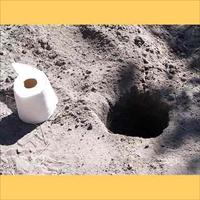GHANA: Dodging faeces on the beaches

On a hot afternoon at Jamestown beach, once considered to be one of Accra’s most famous beaches, 25-year-old Francis Cudjoe and his three friends squat in the open air while in conversation.
They are defecating in full view on the beach, and they are not alone. Off in the distance, one can spot many more residents dropping their pants, squatting and freeing their bowels.
Shortly after they leave, ocean waves wash away their waste.
With four million people without access to a toilet and 4.5 million with no sewage facilities, the World Health Organization (WHO) and UN Children’s Fund (UNICEF) recently ranked Ghana the fourth most unsanitary country in Africa in a total of 52 judged, and the second dirtiest out of 15 West African countries.
The two organisations monitor African countries’ sanitation services.
This ranking has rallied local environmental organisations to clamour for more radical governmental action on Ghana’s deteriorating sanitation record.
For the local Coalition of NGOs in Water and Sanitation (CONIWAS), “the ranking should serve as a reality check for authorities who act as if all is well,” says Executive Secretary Patrick Apoya.
He says Ghana has a “national sanitation crisis” and calls on the government to declare a “national emergency.”
Desperate measures
Walking down the beach, one has to carefully pick one’s steps to avoid stepping in faeces.
“The beach has been where I have come [to do this] since childhood - I can’t stop. In any case even if I want to stop, there is no alternative,” Cudjoe tells IRIN.
With no toilet facilities, people turn to bushes, drains, fields and even outlawed pan latrines to defecate.
The pan latrine is a portable toilet made up of a bucket around which is fitted a wooden frame or seat with a hole in the middle.
When the bucket is full, users pay somebody to dump it in a waste centre. Eventually the waste is pumped out to the sea.
Ghana’s Supreme Court banned the use of these latrines in July 2008, saying they violated people’s dignity, and ordered city authorities to arrest and prosecute users.
The court also ordered the government to build public toilets across the capital and subsidise the construction of toilets in private homes, measures that have yet to be implemented, according to CONIWAS.
Health and economic toll
About one kilometre away from Jamestown beach, women selling food at Makola market in central Accra are surrounded by heaps of refuse. An unbearable stench pervades the air as green fluid seeps from the refuse onto the road.
According to the government’s Environmental Health and Sanitation Directorate (EHSD), Ghana can only manage 30 percent of the daily waste its residents generate.
Such conditions lead to up to eight deaths an hour, estimated Minister of Health Courage Quarfhigah.
Every year, the health ministry reports more than 400,000 out-patient cases of sanitation-related diseases, including diarrhoea, typhoid, cholera and hepatitis, which lead to about 65,000 deaths.
Alias Sory, director general of Ghana’s health services, told IRIN costs are mounting. “Increasingly, the country’s health facilities are being overwhelmed by sanitation related diseases. The cost to the nation is unbearable.”
Dirty streets and beaches can repulse tourists, according to acting executive director of the Ghana Tourist Board, Martin Mireku. “Tourists who come here are not used to such things [defecation on beaches], it’s repulsive and has the potential to drive them away, and the time to act is now.”
Tourism provides 25,000 jobs in Ghana, and contributes more than US$1 billion to the annual economy, representing five per cent of the annual Gross Domestic Product (GDP), according to Mireku.
Criminalising public defecation
But some in the government dispute the figures, saying the problem has been overstated. “We are not saying we don’t have a sanitation problem, but we are certainly better than most of our African colleagues,” said Maxwell Kofi Jumah, the second in command at the Ministry for Local Government, the ministry responsible for monitoring sanitation facilities.
Despite this assessment, the national government is starting to take the issue more seriously, according to CONIWAS’ Apoya. It has drafted what will be the country’s first national sanitation policy, which Apoya anticipates will be approved by late 2008.
Alongside legislation, the national sanitation ministry plans to crack down on sanitation offenders. Working with the justice ministry, government officials plan to employ sanitation watchdogs to punish people who defecate in public spaces, who litter, or who do not maintain sanitary conditions at home by fining or arresting them.
Working in all 138 metropolitan, municipal and districts assemblies across the country they will send out a clear message, according to Apoya: if you unload here, you pay a fine.
But this measure cannot solve the problem said Accra-based teacher John Appiah. "This is putting the cart before the horse - we don't even have public litter bins anywhere in the capital. They are just desperate to prove that they are doing something about a really bad situation and it's just covering up for their failure."
 Back and Next - Back and Next
Back and Next - Back and Next See Also - See Also
See Also - See Also